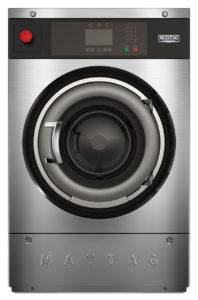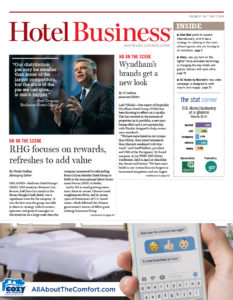BENTON HARBOR, MI—While laundry is not something that comes to most guests’ minds when they are choosing a property to stay in, it is one of those back-of-house areas that can have a direct effect on the bottom line.
“Clean linens and beds for hotels are directly related to selling room nights,” said Nick Koukourakis, senior product development manager with Whirlpool Corporation Commercial Laundry, which also has the Maytag Commercial Laundry and ADC brands. “Laundry operations—specifically, technology within laundry operations—can have a direct impact on a property’s bottom line. Technology, for instance, is essential for maintaining consistency, reducing human error and maximizing efficiency. It also allows an operation to manage labor costs more effectively. Approximately half of every dollar spent on a laundry operation goes toward labor. Maintaining an efficient operation means helping to positively affect the overall bottom line of a property.”
Koukourakis said that when a property is considering what machines to purchase, a general rule of thumb to follow is to allow one pound of washer capacity for each room. “For example, if a hotel has 100 rooms, the average amount of laundry per room per day is 15 lbs., bringing that total property to approximately 1,500 lbs. per day,” he said. “Using an eight-hour shift, that means equipment must cycle through an average of 200 lbs. of laundry per hour. This is called ‘right-sizing’ of equipment.”
He continued, “While that may seem overwhelming, remember, manufacturers and distributors are trusted resources. They’re there to help with choosing equipment, room design, product installation and everything in between, which ultimately impacts laundry operation costs.”
With a labor shortage affecting the industry, staff efficiency when it comes to laundry is an important trend. “One way to maximize staff efficiencies, while helping to reduce overall laundry spend, is to establish a training program, as well as implement easy-to-follow instructions with simple, one-touch, pre-programmed cycle selections for a variety of load types,” said Koukourakis.
When it comes to equipment, water and energy efficiency are top trends. “As owners and operators become better informed about equipment options and understand their impact on the environment, as well as laundry operation efficiency (both cost and throughput), they are demanding more from laundry equipment manufacturers,” he said.
The new Maytag Commercial Laundry Multi-Load Washer represents these continuing trends. The new washer can be configured in hundreds of different ways, allowing properties to choose among different water heating, electrical connection, controls, drain, water inlet and construction options. Available in 20- to 65-lb. sizes, this washer helps simplify laundry room operations with a full-color LCD screen and Maytag Connect 360° technology. It also offers properties the ability to customize wash formulas to suit every on-premises laundry need.
Manufacturers need to deliver efficient products that don’t sacrifice wash performance or drive costs up. “For example, incorporating multi-load, high-speed washers with a g-force of at least 200 will assist properties in throughput and keep utility costs down,” he said. “Higher g-force uses technology to extract water in the washer instead of the dryer, allowing linens to dry more quickly and gently, while decreasing the amount of energy used.”
Koukourakis said that another attribute that hotel owners should look for are dryers with residual moisture control (RMC), which allows the amount of moisture to be sensed in a load and reduces the heat input while the tumbler continues to run, ensuring linens aren’t over dried. “This helps to extend the life of the linens, which can be costly to replace,” he said. HB
To outsource or not to outsource?
OCEANPORT, NJ—While many hotels run their own laundry operations, some hotels outsource to other companies. There are many factors to consider when making the decision.
“Hotel companies typically outsource because the ownership prefers not to invest capital in an equipment replacement program,” said Tom Mara, president of Victor Kramer Company, a laundry consultant. “They would rather invest in projects that generate revenue, such as opening a restaurant or spa, or refurbishing an existing restaurant.”
In some cases, even if capital is available, the challenge can come in finding qualified, experienced laundry managers to operate an on-premises laundry. “In certain markets, the decision to outsource is driven by the difficulty to find and maintain a stable laundry workforce,” he said. “The challenge of hiring, training and maintaining a reliable workforce distracts department leaders to manage and control other essential services, such as housekeeping.”
He continued, “At many hotels where we were retained to evaluate the laundry operation, due to the absence of a stable laundry staff, housing employees were assigned to work in the laundry to meet the workload demand. This, of course, impacted housekeeping services and distorted the cost of laundry service, since the housekeeping staff’s payroll cost was not allocated to the laundry department.”
Perceived cost reduction and equipment breakdown are other fundamental reasons hotel companies outsource. “Equipment preventive maintenance and repairs are handled by the hotel’s engineering staff, none of whom may have experience with laundry equipment,” said Mara. “In terms of the perception of cost reduction, hotel companies don’t know the volume of linen utilized—pounds or pieces—thus, the impact of surcharges is often not included in the comparison of outsourcing to on-premises processing.”
There are certain areas that are not always factored in when considering outsourcing. “Most hotels do not meter utility usage; thus, the cost of utilities is not allocated to the laundry department, nor is the payroll, related cost for the hotel’s mechanics, and the cost of parts purchases and preventive maintenance lubrication,” he said. “We find that hotels also do not project the cost impact of linen replacement when comparing outsourcing to on-premises processing. In our experience, the cost of linen replacement is usually 10-15% higher under a program of outsourcing.”
While one might think it is the case, sometimes, space isn’t saved when outsourcing. “Even when a laundry is closed in favor of outsourcing, the hospitality operation will still require space for the storage of clean and soiled linens. Oftentimes, that ends up being the existing laundry space—thus, outsourcing does not result in a pickup of space for other uses,” said Mara.



